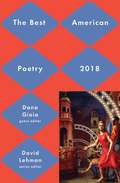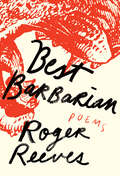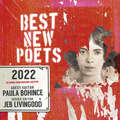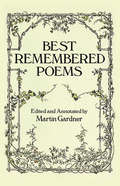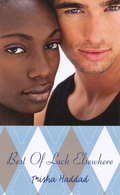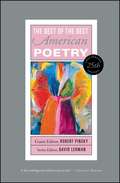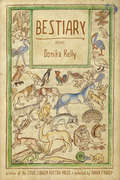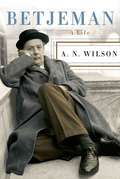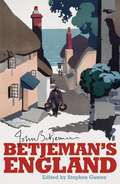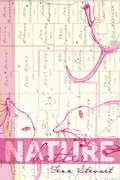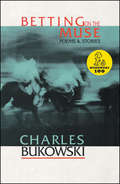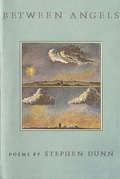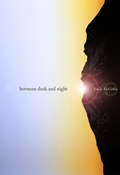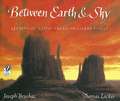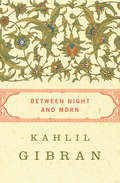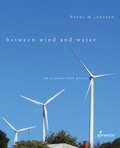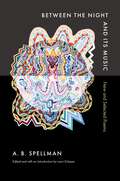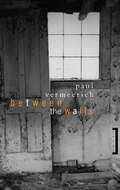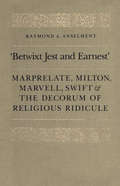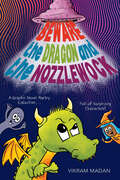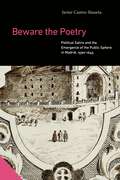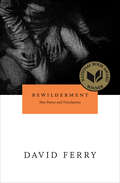- Table View
- List View
Best American Poetry 2017 (The Best American Poetry series)
by David Lehman Natasha TretheweyEdited by Pulitzer Prize-winner and nineteenth US Poet Laureate Natasha Trethewey, The Best American Poetry 2017 brings together the most notable poems of the year in the series that offers “a vivid snapshot of what a distinguished poet finds exciting, fresh, and memorable” (Robert Pinsky).Librarian of Congress James Billington says Natasha Trethewey “consistently and dramatically expanded the power” of the role of US Poet Laureate, holding office hours with the public, traveling the country, and reaching millions through her innovative PBS NewsHour segment “Where Poetry Lives.” Marilyn Nelson says “the wide scope of Trethewey’s interests and her adept handling of form have created an opus of classics both elegant and necessary.” With her selections and introductory essay for The Best American Poetry 2017, Trethewey will be highlighting even more “elegant and necessary” poems and poets, adding to the national conversation of verse and its role in our culture. The Best American Poetry is not just another anthology; it serves as a guide to who’s who and what’s happening in American poetry and is an eagerly awaited publishing event each year. With Trethewey’s insightful touch and genius for plumbing the depths of history and personal experience to shape striking verse, The Best American Poetry 2017 is another brilliant addition to the series.
Best American Poetry 2018 (The Best American Poetry series)
by David Lehman Dana GioiaThe 2018 edition of the Best American Poetry—“a ‘best’ anthology that really lives up to its title” (Chicago Tribune)—collects the most significant poems of the year, chosen by Poet Laureate of California Dana Gioia.The guest editor for 2018, Dana Gioia, has an unconventional poetic background. Gioia has published five volumes of poetry, served as the Chairman of the National Endowment for the Arts, and currently sits as the Poet Laureate of California, but he is also a graduate of Stanford Business School and was once a Vice President at General Foods. He has studied opera and is a published librettist, in addition to his prolific work in critical essay writing and editing literary anthologies. Having lived several lives, Gioia brings an insightful, varied, eclectic eye to this year’s Best American Poetry. With his classic essay “Can Poetry Matter?”, originally run in The Atlantic in 1991, Gioia considered whether there is a place for poetry to be a part of modern American mainstream culture. Decades later, the debate continues, but Best American Poetry 2018 stands as evidence that poetry is very much present, relevant, and finding new readers.
Best Barbarian: Poems
by Roger ReevesIn his brilliant, expansive second volume, Whiting Award–winning poet Roger Reeves probes the apocalypses and raptures of humanity—climate change, anti-Black racism, familial and erotic love, ecstasy and loss. The poems in Best Barbarian roam across the literary and social landscape, from Beowulf’s Grendel to the jazz musician Alice Coltrane, from reckoning with immigration at the U.S.–Mexico border to thinking through the fraught beauty of the moon on a summer night after the police have killed a Black man. Daring and formally elegant, Best Barbarian asks the reader: “Who has not been an entryway shuddering in the wind / Of another’s want, a rose nailed to some dark longing and bled?” Reeves extends his inquiry into the work of writers who have come before, conversing with—and sometimes contradicting—Walt Whitman, James Baldwin, Sappho, Dante, and Aimé Césaire, among others. Expanding the tradition of poetry to reach from Gilgamesh and the Aeneid to Drake and Beyoncé, Reeves adds his voice to a long song that seeks to address itself “only to freedom.” Best Barbarian asks the reader to stay close as it plunges into catastrophe and finds surprising moments of joy and intimacy. This fearless, musical, and oracular collection announces Roger Reeves as an essential voice in American poetry.
Best New Poets 2022: 50 Poems from Emerging Writers (Best New Poets)
by Jeb LivingoodAn annual anthology of 50 poems from emerging writers.
Best Poems of the Brontë Sisters (Dover Thrift Editions)
by Candace Ward Brontë Emily Anne"In this collection of their poetry, published under gender-concealing pseudonyms, we get an intimate glimpse of their fears, hopes, faith, and desires." -- Haunted Library"This collection is not only for fans of the Brontë Sisters and classic rhyming poetry but also for readers that crave heartbreaking gothic angst." -- Eastside Middle SchoolAmong the most talented siblings in English literary history, the Brontë sisters are best remembered for their novels: Emily's Wuthering Heights, Charlotte's Jane Eyre, and Anne's Tenant of Wildfell Hall, among other works. It is less well known that the sisters also composed a considerable amount of fine poetry. This volume contains forty-seven poems by all three sisters. Selections include Charlotte's "Presentiment," "Passion," two poems on the deaths of her sisters, and six more. There are twenty-three poems by Emily (considered the best poet of the three), including "Faith and Despondency" and "No Coward Soul Is Mine." The works of all three sisters share the qualities of intelligence, awareness, and heartfelt emotion, expressed in simple, highly readable verse. Gathered in this handy, inexpensive collection, the poems represent a superb introduction to a lesser-known aspect of the Brontës' literary art.
Best Remembered Poems
by Martin GardnerThe 126 poems in this superb collection of 19th- and 20th-century British and American verse range from the impassioned "Renascence" of Edna St. Vincent Millay to Edward Lear's whimsical "The Owl and the Pussycat" and James Whitcomb Riley's homespun "When the Frost Is on the Punkin." Famous poets such as Wordsworth, Tennyson, Whitman, and Frost are well-represented, as are less well-known poets such as John McCrae ("In Flanders Fields") and Ernest Thayer ("Casey at the Bat"). Includes 10 selections from the Common Core State Standards Initiative: "The Owl and the Pussycat," "Casey at the Bat," "Jabberwocky," "O Captain! My Captain!," "Paul Revere's Ride," "Ozymandias," "The Raven," "Because I Could Not Stop for Death," "Mending Wall," and "Ode on a Grecian Urn."
Best of the Best American Poetry: 25th Anniversary Edition
by David LehmanRobert Pinsky, distinguished poet and man of letters, selects the top 100 poems from twenty-five years of The Best American PoetryThis special edition celebrates twenty-five years of the Best American Poetry series, which has become an institution. From its inception in 1988, it has been hotly debated, keenly monitored, ardently advocated (or denounced), and obsessively scrutinized. Each volume consists of seventy-five poems chosen by a major American poet acting as guest editor—from John Ashbery in 1988 to Mark Doty in 2012, with stops along the way for such poets as Charles Simic, A. R. Ammons, Louise Glück, Adrienne Rich, Billy Collins, Heather McHugh, and Kevin Young. Out of the 1,875 poems that have appeared in The Best American Poetry, here are 100 that Robert Pinsky, the distinguished poet and man of letters, has chosen for this milestone edition.
Bestiary: Poems
by Donika KellyDonika Kelly's fierce debut collection, longlisted for the 2016 National Book Award and winner of the 2015 Cave Canem Poetry PrizeI thought myself lion and serpent. Thoughtmyself body enough for two, for we.Found comfort in never being lonely.What burst from my back, from my bones, what livedalong the ridge from crown to crown, from maneto forked tongue beneath the skin. What clamorwe made in the birthing. What hiss and rumbleat the splitting, at the horns and beard,at the glottal bleat. What bridges our back.What strong neck, what bright eye. What menagerieare we. What we've made of ourselves.--from "Love Poem: Chimera"Across this remarkable first book are encounters with animals, legendary beasts, and mythological monsters--half human and half something else. Donika Kelly's Bestiary is a catalogue of creatures--from the whale and ostrich to the pegasus and chimera to the centaur and griffin. Among them too are poems of love, self-discovery, and travel, from "Out West" to "Back East." Lurking in the middle of this powerful and multifaceted collection is a wrenching sequence that wonders just who or what is the real monster inside this life of survival and reflection. Selected and with an introduction by the National Book Award winner Nikky Finney, Bestiary questions what makes us human, what makes us whole.
Betjeman
by A. N. WilsonJohn Betjeman was by far the most popular poet of the twentieth century; his collected poems sold more than two million copies. As poet laureate of England, he became a national icon, but behind the public man were doubts and demons. The poet best known for writing hymns of praise to athletic middle-class girls on the tennis courts led a tempestuous emotional life. For much of his fifty-year marriage to Penelope Chetwode, the daughter of a field marshal, Betjeman had a relationship with Elizabeth Cavendish, the daughter of the Duke of Devonshire and lady-in-waiting to Princess Margaret. Betjeman, a devout Anglican, was tormented by guilt about the storms this emotional triangle caused.Betjeman, published to coincide with the hundredth anniversary of the poet's birth, is the first to use fully the vast archive of personal material relating to his private life, including literally hundreds of letters written by his wife about their life together and apart. Here too are chronicled his many friendships, ranging from "Bosie" Douglas to the young satirists of Private Eye, from the Mitford sisters to the Crazy Gang. This is a celebration of a much-loved poet, a brave campaigner for architecture at risk, and a highly popular public performer. Betjeman was the classic example of the melancholy clown, whose sadness found its perfect mood music in the hymns of a poignant Anglicanism.
Betjeman's England
by John Betjeman Stephen GamesFor more than half a century Betjeman's writings have awakened readers to the intimacy of English places - from the smell of gaslight in suburban churches, to the hissing of backwash on a shingle beach. Betjeman is England's greatest topologist: whether he's talking about a townhall or a teashop, he gets to the nub of what makes unexpected places unique. This new collection of his writings, arranged geographically, offers an essential gazetteer to the physical landmarks of Betjeman Country. A new addition to the popular series of Betjeman anthologies, following on from Trains and Buttered Toast and Tennis Whites and Teacakes, this is a treasure trove for any Betjeman fan and for anyone with a love for the rare, curious and unique details of English life.
Better Nature
by Fenn StewartMuch of the language that makes up Better Nature—the first poetry collection by writer and academic Fenn Stewart—is drawn from a diary that Walt Whitman wrote while travelling through Canada at the end of the nineteenth century.But rather than waxing poetic about the untouched Great White North, Stewart inlays found materials (early settler archives, news stories, email spam, fundraising for environmental NGOs, and more) to present a unique view of Canada's "pioneering" attitude towards "wilderness"—one that considers deeper issues of the settler appropriation of Indigenous lands, the notion of terra nullius, and the strategies and techniques used to produce a "better nature" (that is, one that better serves the nation).
Betting on the Muse
by Charles BukowskiBetting on the Muse is a combination of hilarious poetry and stories. Charles Bukowski writes about the real life of a working man and all that comes with it.
Between Angels
by Stephen Dunn"Between Angels affirms what we are capable of in our best moments--grace, tenderness, love--while acknowledging that the human heart can be merciless. It's a book of great breadth."--Gregory Djanikian, Philadelphia Inquirer
Between Dusk and Night
by Emily McGiffinThere are many journeys encompassed in the pages of this mature and well-crafted first collection; literal travels to different parts of the world, to Europe and Africa, are the outward manifestation of the inward quest, the asking of the old but still essential questions: What is real? What is true? What is honourable? What is right? Yet these questions are new in that the poet is deeply concerned with the need to find a new paradigm, a new way to relate to the earth at this time of ever-heightening environmental crisis. And this seeking for how to be in and of the earth is paralleled by a personal search for intimacy with her fellow humans.
Between Earth and Sky: Legends of Native American Sacred Places
by Joseph BruchacThrough the guidance of his uncle and the retelling of various Native American legends, a young boy learns that everything living and inanimate has its place, should be considered sacred, and given respect..
Between Night and Morn
by Kahlil GibranA selection of early works by bestselling author Kahlil Gibran offers an accessible introduction to his beautiful language and inspiring worldview The prolific writings of Kahlil Gibran, author of The Prophet, continue to inspire a devoted international following and have transformed modern Arabic literature. In this volume of early writings, Gibran&’s simple yet lyrical style crosses from prose to poetry and yields insight into his dedication and inner vision of beauty, including the tale of a strange hermit in &“The Tempest,&” the discovery of love lost to war in &“The Mermaids,&” and the long voyage of sea and soul in the prose poem &“Between Night and Morn.&” From scathing indictments against worldly wrongs to tender spiritual exultations, Between Night and Morn powerfully evokes the mood and magnetism of Gibran.
Between Wind and Water
by Berni M JanssenAlmost everyone thinks that wind power is a great advance, but it too can be done the wrong way. berni m janssen through an extraordinary series of poems that are both riveting and deeply saddening shares the stories of the people living in an idyllic country area into which wind turbines are erected. The world of nature, birds, trees, flowers as well as wind, water and dust come to life, while the world of those subjected to the body-grinding low-pitched sounds through so many sleepless nights fall apart. berni m janssen is a highly respected performance poet and her starkly visual and visceral poems will leave audiences writhing in disbelief.
Between You and Me: Selected Kannada Poems of G. S. Sivarudrappa
by G. S. Sivarudrappa O. L. NagabhusanasvamiThe poems included in this anthology are selected with a view of representing the range of poet's major concerns.
Between the Night and Its Music: New and Selected Poems (Wesleyan Poetry Series)
by A. B. SpellmanA. B. Spellman is an acclaimed American poet, music critic, and arts administrator. He is widely recognized as a leading figure in the Black Arts Movement of the 1960s and 1970s, a cultural and literary movement that emphasized Black identity, pride, and artistic expression. Between the Night and Its Music brings together A. B. Spellman's early work with a collection of powerful new poems. Spellman's literary career took flight in 1965 with his debut poetry collection, The Beautiful Days, which introduced his distinctive voice blending elements of jazz, blues, and African oral traditions. In 1966, Four Lives in the Bebop Business established Spellman as a respected music critic and scholar. It was a groundbreaking work that chronicled the lives and struggles of four influential jazz musicians. Spellman held senior positions at the National Endowment for the Arts for thirty years with lasting impact on arts funding for inner cities and rural and tribal communities. In addition to poems from The Beautiful Days (1965) and Things I Must Have Known (2008), this book contains a trove of new and uncollected poems, confirming Spellman's continued centrality to contemporary American literature. This is an essential volume for readers already familiar with Spellman, and an excellent introduction for new readers. Lauri Scheyer's introduction situates Spellman's work within jazz writing, Black Arts, and American poetry broadly.[sample text]THE TWISTa dancer's worldis walls, movementconfined: musicgod's last breath.rhythm: the last beating of his heart. a dancerfollows that sound, blindto its source, toward wallswith others. she cannot dance aloneshe thinks of thoughtas windows, as ice around the dancecan you break it? move
Between the Walls
by Paul VermeerschPaul Vermeersch examines the forces that divide us and isolate us as individuals in both the natural and man-made worlds, at the moments when those worlds intersect, and in the places where we live and work. During a violent row between teenage boys, a starling explodes like a hand grenade. A clutter of inbred cats plays out the rise and fall of mankind in a secluded country barn. While driving his girlfriend home, a young man is forced to alter the course of his future by the sudden appearance of a plague of toads. And in the harrowing final sequence, we are taken on a tour through a fragile city verging on its own ruin. As fantastic as they are visceral, these poems shed new light on our darkest corners and take us deep between the walls, those that are thrust up before us as well as those of our own making.
Betwixt Jest and Earnest: Marprelate, Milton, Marvell, Swift & the Decorum of Religious Ridicule
by Raymond A. AnselmentMarprelate, Milton, Marvell, and Swift are among the best prose satirists in a remarkably rich literary era. Focusing on these key figures, 'Betwixt Jest and Earnest' examines the theory and practice of religious prose in the sixteenth and seventeenth centuries. Recognizing the difficulties inherent in attempting to transform unimaginative animadversion into effective satire, it analyses the ways in which Marprelate's tracts, Milton's anti-prelatical satires, Marvell's The Rehearsal Transpros'd, and Swift's A Tale of a Tub variously resolve the decorum of religious satire. Although the study is not specifically an intellectual history or a rigid definition of religious attitudes towards jest, it does bring together basic symptoms of altering sensibilities in the period. Marprelate, Milton, Marvell, and Swift represent diverse religious dispositions, but they share a similar satiric vision. Each recognizes the central importance of manner, and all develop dramatic satire heavily dependent on character, an emphasis which often displaces the immediate issues contested, but never obscures the larger concerns the satirists pursue. Their preoccupations with the nature of tradition, their emphasis on the self, and their sensitivity to language reflect similar involvements in questions of certainty and absolutism. The virtues and abuses they find in such central questions are not unique to them or their time, but their emphases are, for they wrote in an age in which sensitive men could confront revolution and reaction with an assurance not easily attainable once that era had passed.
Beware the Dragon and the Nozzlewock: A Graphic Novel Poetry Collection Full of Surprising Characters!
by Vikram MadanPerfect for fans of Jack Prelutsky and Shel Silverstein, award-winning author Vikram Madan&’s new poetry collection features delicious vocabulary, hilarious poems, and a full-color graphic novel format!Vikram Madan packs this whimsical poetry collection with surprise twist after surprise twist and a host of unusual characters. In these pages, you&’ll meet ghost guppies (and the brave girl who creates them), Stan the Slouching Man™ who&’ll teach you blackbelt slouching, oozing dinosaurs called squishosaurs, a suspicious dragon, and the Nozzlewock (a nose with super-vacuum strength), among many other memorable heroes. Recurring characters and subplots in the art weave the poems together, adding to the merriment. This quirky collection in full-color graphic novel format begs to be read over and over again.
Beware the Poetry: Political Satire and the Emergence of a Public Sphere in Madrid, 1595–1643 (Interactions in the Early Modern Age)
by Javier Castro-IbasetaIn the early seventeenth century, Spanish rulers were confronted by an avalanche of political satires. Beware the Poetry shows how these poetic libels helped articulate an early form of the public sphere, profoundly transforming political culture.Exploring a rich trove of mostly anonymous satirical works, together with newsletters, sermons, and plays, Javier Castro-Ibaseta reconstructs the experiences of Madrilenians during the reigns of Philip III and Philip IV. Castro-Ibaseta proposes an original theory of political publics that corrects approaches that assume early modern Spain’s public sphere mirrored the politics of England or France. Instead, he shows that in Spain publicness was distinct because the satires—about the king’s favorite, and even about the king himself—were consumed for pleasure and entertainment. They did not create political communities or stir rebellious movements. Read diachronically, the long, continuous, evolving collection of satires reveals not just the opinions of the poets but something far more difficult to reconstruct: the shifting demands, interests, uncertainties, and worldviews of the audience—that is, the structure and dynamics of Madrid’s emerging public sphere. Applying an interdisciplinary approach of literary criticism and historical method, Beware the Poetry presents an exciting new take on politics and poetry during the period often referred to as the Spanish Decadence. It will be of special interest to scholars of early modern politics and Spanish literature and culture.
Bewilderment: New Poems and Translations (Phoenix Poets)
by David FerryWinner of the National Book Award for Poetry. &“This is one of the great books of poetry of this young century.&”—Dan Chiasson, The New Yorker To read David Ferry&’s Bewilderment is to be reminded that poetry of the highest order can be made by the subtlest of means. The passionate nature and originality of Ferry&’s prosodic daring works astonishing transformations that take your breath away. In poem after poem, his diction modulates beautifully between plainspoken high eloquence and colloquial vigor, making his distinctive speech one of the most interesting and ravishing achievements of the past half century. Most poets write inside a very narrow range of experience and feeling, whether in free or metered verse. But Ferry&’s use of meter tends to enhance the colloquial nature of his writing, while giving him access to an immense variety of feeling. Sometimes that feeling is so powerful it&’s like witnessing a volcanologist taking measurements in the midst of an eruption. Ferry&’s translations, meanwhile, are amazingly acclimated English poems. Once his voice takes hold of them they are as bred in the bone as all his other work. And the translations in this book are vitally related to the original poems around them. &“These poems highlight an age-old quest for truth that leads the speaker to consider his present and past, and to translate works by Horace, Virgil, Catullus and others . . . vivid and sometimes heartbreaking.&”—The Washington Post &“Astonishing—a haunted book where ghosts prove that the haunted are still alive and allow for the continuing company of literature.&”—Slate &“A necessary book . . . shocking and heartbreaking.&”—The Rumpus

